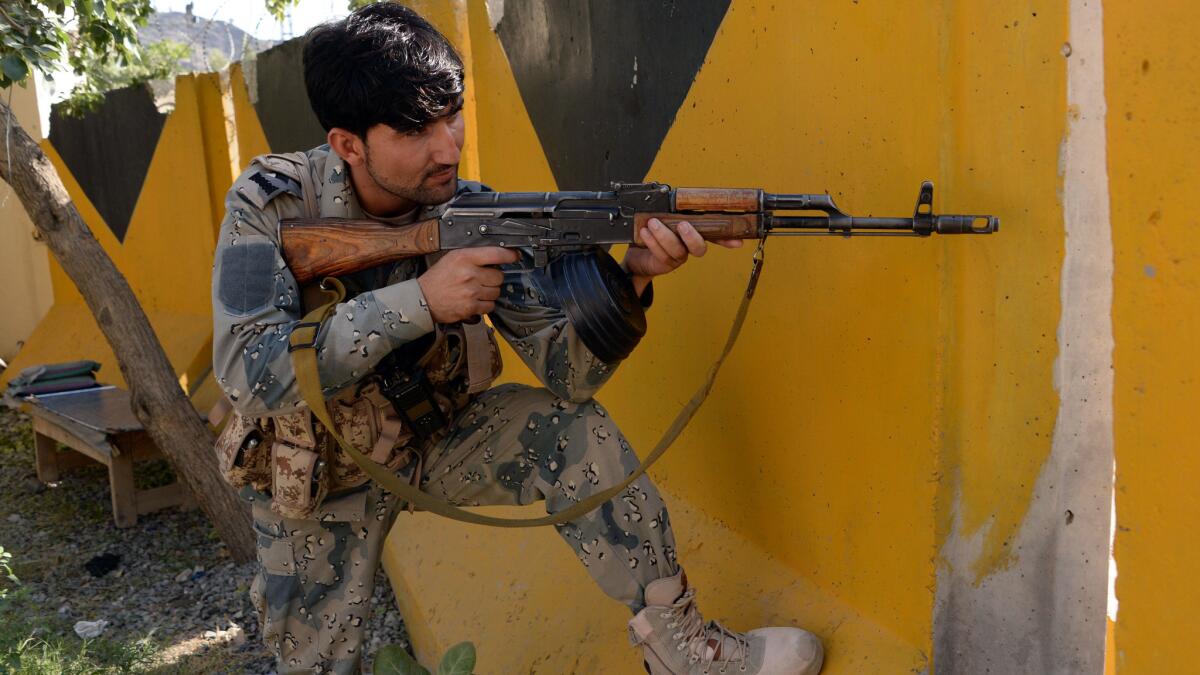Pakistan closes border crossing with Afghanistan after clashes between security forces

- Share via
Reporting from Peshawar, Pakistan — Pakistan closed its main border crossing with Afghanistan and imposed a de facto curfew Monday after overnight clashes, including an exchange of gunfire, between the countries’ border security forces.
One Afghan guard was killed and a total of 22 people were wounded, officials said.
Residents of the border town of Landi Kotal in Pakistan said that after the security forces exchanged heavy fire, the local administration warned them early Monday to remain indoors.
Pakistani authorities also closed the immigration and customs offices at Torkham, the main border crossing, and sent in reinforcements of paramilitary forces.
The clashes began Sunday evening when Pakistani officials began installing a security fence about 30 yards inside their territory. The fence is part of increased security measures that Pakistan says will better regulate the movement of people between the countries and curb infiltration by militants and criminals.
See more of our top stories on Facebook »
Gen. Zarawar Zahid, police chief of Nangarhar, Afghanistan, said one Afghan security officer was killed and six were wounded, the Associated Press reported. He said Pakistani forces opened fire after the Afghans asked them to stop working on the fence, which he claimed is located on no-man’s land.
Afghanistan does not recognize the present boundary, the so-called Durand Line, as an international border, and has denounced Pakistan’s plans to erect a fence at the crossing.
The Afghan government has called on Pakistan to ease some border controls to facilitate the movement of refugees. Pakistan hosts about 1.5 million documented Afghan refugees in addition to more than 1 million who do not have legal status.
Pakistani officials said they had informed Afghan border police of the fence installation in advance. A statement from the Pakistani military accused Afghanistan of “unprovoked firing” into Pakistani territory.
“Pakistani authorities informed Afghan officials about the gate installation on its own territory, but despite that Afghan border police resorted to heavy firing,” a Pakistani official said on condition of anonymity because he was not authorized to speak to the media.
NEWSLETTER: Get the day’s top headlines from Times Editor Davan Maharaj »
The Torkham highway serves as the main trade route from Pakistan to Afghanistan and Central Asian states, and has also been the major supply line for U.S.-led coalition forces in Afghanistan. Hundreds of vehicles were stranded on both sides of the border Monday.
Residents at Landi Kotal said they were breaking their daylong fast – customary during the holy month of Ramadan – on Sunday when the firing began.
“Shells were flying over residential quarters and people started fleeing their homes,” said Sabir Shinwari, a resident reached by phone.
He said shells fired from the Afghan side caused partial damage to houses and that firing from both sides continued into the morning hours Monday.
Officials said the movement of visitors from Afghanistan to Pakistan has drastically decreased since Islamabad began installing fences at Torkham about two months ago. The move came after a January attack on a university in Charsadda, in northern Pakistan, that left at least 21 people dead. Pakistan says militants involved in the attack entered the country from Afghanistan via Torkham.
Between 1,000 and 2,000 travelers with visas have been entering Pakistan daily from Afghanistan, down from the 15,000 to 25,000 who crossed via Torkham previously, according to officials.
ALSO
Blasts rock Shanghai airport ahead of Disney opening; four injured, suspect hospitalized
Oscar Pistorius is a depressed, ‘broken man,’ psychologist testifies at sentencing hearing
A rebellion inside a small Indian sect seeks to end a brutal custom: female genital mutilation
Special correspondent Ali reported from Peshawar, Pakistan. Times staff writer Shashank Bengali in Mumbai, India, contributed to this report.
Follow @SBengali on Twitter for more news from South Asia
More to Read
Sign up for Essential California
The most important California stories and recommendations in your inbox every morning.
You may occasionally receive promotional content from the Los Angeles Times.













